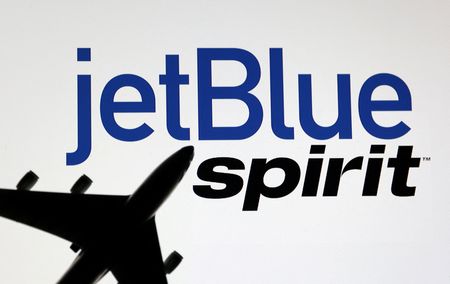
By Diane Bartz and David Shepardson
WASHINGTON (Reuters) -JetBlue Airways Corp said on Monday it believes there is a “high likelihood” the U.S. Justice Department will file an antitrust lawsuit this week to block its $3.8 billion takeover of low-cost rival Spirit Airlines Inc.
JetBlue said in a statement that it accounted for the possibility of a lawsuit when it provided a timeline to close the deal in the first half of 2024. The extended timeline gives the companies time to fight the government in court. The Transportation Department, which is also reviewing the deal, is expected to take parallel action to stop the planned transaction, Bloomberg News reported.
Neither the Justice nor Transportation departments have responded to requests for comment.
JetBlue shares rose about 1% while Spirit shares tumbled almost 10% in late trading.
JetBlue prevailed in a months-long bidding war for Spirit Airlines after the ultra-low-cost carrier accepted its offer in late July.
JetBlue Chief Executive Robin Hayes said on Monday he expected a government lawsuit to stop the deal and that the company would fight it, the Wall Street Journal reported.
“My expectation is that we will get sued by the DOJ this week,” Hayes was quoted as saying. “My sense is they came to the table with their minds made up.”
The companies have offered to sell Spirit’s holdings in Boston and New York, along with some assets in Florida, in a bid to ease the government’s antitrust concerns.
JetBlue is also awaiting the outcome of a lawsuit filed by the U.S. Justice Department which asks the court to force JetBlue and American to scrap its Northeast Alliance. A trial in the case was held last year.
JetBlue’s acquisition of Spirit had been expected to face a tough antitrust review from the beginning because the four biggest airlines – American Airlines, United Airlines, Delta Air Lines and Southwest Airlines – control 80% of the U.S. domestic market.
JetBlue has argued that the merger, which would create the fifth largest U.S. airline with a market share of 9%, would allow it to better compete with the legacy airlines.
(Reporting by Diane Bartz and David Shepardson in Washington; Editing by Jonathan Oatis, Richard Chang and Anna Driver)

